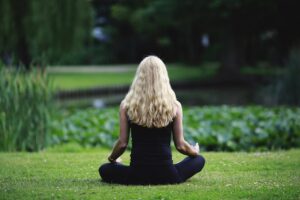
Mindfulness has gone from being a woo, hippy practice to mainstream stress management tool. But misconceptions are still rife and many people that would benefit assume its not for them. Or try it but think they’re getting it wrong and give up. One of the conditions mindfulness is particularly helpful for is anxiety, one of the biggest mental health conditions in the world. It impacts on jobs and relationships and at its most severe it can keep people housebound. Often people rely on medication or long waits for therapy without realising that mindfulness offers a medication free, life long way of managing anxiety symptoms. This article will explain how mindfulness can help with anxiety and whether to use a mindfulness coaching sessions.
What is anxiety?
Anxiety means experiencing an excessive amount of fear, worry and panic which can stop a person from functioning well or can make daily life very distressing. Typical symptoms of anxiety include:
- Overthinking situations that haven’t, or are unlikely, to happen such as (What if I lose my job, what if my children get hurt, what if our plane crashes)
- Experiencing panic attacks in certain situation such as crowded places or even out of the blue.
- Physical symptoms such as dread in chest, knot in stomach, dizziness, palpitations, shallow breathing
- Inability to sleep due to racing, worrying thoughts
- Worrying about situations before they have happened such as going away or
Often people experience anxiety in relation to particular issues such as social anxiety, crowded places or travelling for example. Anxiety creates vicious cycles which can seem very difficult to get out of. So for example, anxious thinking creates anxious feelings in the body which in turn make a person feel more anxious. Those anxious feelings then increase the anxious thinking and the cycle continues.
Experiencing high levels of anxiety is caused by the bodies “fight and fliight” system being on high alert. We have evolved with this fight and flight system as it protected us against physical threats in stone age times. But now it is triggered by situations such as a build up of stressful experiences or traumatic experiences. You can read more about the causes and different treatments for anxiety here.
What is mindfulness?
Mindfulness is a tool we can use to help us respond differently to thoughts and feelings causing us distress. You awareness of the present moment, in a non judgmental way, is increased by focussing your attention on “anchors” such as breath, body or sounds. When our attention is rested on these “anchors” we are better able to observe with what is going on in our mind and body. We can then cultivate a sense of curiosity and acceptance towards it rather than aversion.
For example, rather than getting consumed with unhelpful thoughts we are able to take a step back, observe them and know that they are just thoughts. We also have more control in stopping thoights from spiralling by giving us more choice in where we place our addition.
But its not all about whats happening in the mind. One of the most important aspects of mindfulness is body awareness. This is because alot of what we feel impacts on the body and we are either unaware, but it impacts us anyway, or we are so aware we react unhelpfully to it. When we increase body awareness we can pay closer attention to whats going on for us, and respond differently. As people with anxiety will know, most of the symptoms are “physical” (i.e dread in chest, heart beating, shallow breathing) so the ability to tune into these symptoms and respond differently can be a game changer.
How can mindfulness help anxiety?
As described above one of the main symptoms of anxiety is caused by being caught up in unhelpful, worrying thoughts. You are likely to assume the worst about a situation or overthink events in the future. Mindfulness helps you to have a non judgmental awareness of these thoughts so that you can see they are just thoughts. But, as anxiety symptoms are also very physical, people find that the feelings in the body feel scary and uncontrollable. However, mindfulness helps you to be curious and more accepting about these feelings so that they feel managable. When responded to in this way the vicious cycles that keep anxiety going are disrupted.
Becoming more mindfulness also helps to actively relax the body and breath which release the anxiety chemicals that have usually built up. This means we will be better able to combine mindfulness with other tools known to be effective for anxiety such as breathwork and muscle relaxation.
There is now hige emounts of research to support that mindfulness is an effective tool for managing anxiety and offers a medication way of reducing it for life.
How can I start practicing mindfulness?
It can take a while for your brain to develop the ability to use mindfulness so regular practice at first is important. However, it can be good idea to start with short practices and build up. Generally speaking mindfulness practices are divided into two types. Practices weaved into our everyday life and planned meditation practices. The following are good ways to start.
- Pay attention more when you eat and drink a few times a day. Such as drinking tea or eating a meal. Really notice how things look, taste and smell. When your mind wanders notice this and bring it back to the food.
- Do the same with some activities such as going for a walk or taking a shower. Drop into your senses and really pay attention to what you can hear, feel and see. Your mind will wander, and thats normal, notice what kind of thoughts you have with curiosity and bring your attention back.
- Pause a few times and day or when you are feeling anxious. Bring a curious attention to what is going on in your body. Is your heart beating faster? Are your muscles tense? Is your breath shallow. Name what is going on for you including your emotions i.e. “I am noticing that I am feeling anxious”. This will help them feel less overwhelming.
- Spend a few minutes a day meditating. For example, get an app or guided practice from youtube. Try using your breath at first or you can use your feet or sounds. Focus on the anchor and each time your mind wanders, simply notice with curiosity and bring it back.
Should I use mindfulness coaching for anxiety?
You can teach yourself mindfulness by downloading an app, reading a book or getting trying some guided practices. However, accessing mindfulness coaching means you will be fully supported to use mindfulness to alleviate anxiety. Mindfulness coaching can tailor the sessions to suit your goals and also ensure you fully understand how to use it. Mindfulness is a simple technique but can be hard to do it right without guidance from a trained teacher. You might benefit from mindfulness coaching if:
- You have tried mindfulness before and found it hard
- You are keen to get the hang of it quickly to manage anxiety
- You often give things up and find it hard to fit things in so want some accountability.
- You like working with poeple either 1-1 or in groups.
Some mindfulness teachers can also incorporpate other tools such as self compassion practice, which can help if a person is also very self critical, or therapy if anxiety is due to traumatic experiences.
Mindfulness Coaching Services From Contented Mind
I am a certified mindfulness coach as well as qualified therapist. In our 1-1 mindfulness coaching sessions I will provide tailored mindfulness and self compassion tools so you can manage your wellbeing for life. All my sessions are followed up by personal emails with resources and guided practices.
If needed we can combine mindfulness with therapy in our sessions. I can work with a very wide range of mental health issues but specialise in anxiety caused my low self esteem such as people pleasing and self criticism. If you are interested in accessing my mindfulness coaching services please contact me
Group Mindfulness Coaching
I also provide group mindfulness events through the year both online and in person (Manchster/Glossop).
Please click below to join my mailing list for future events.

